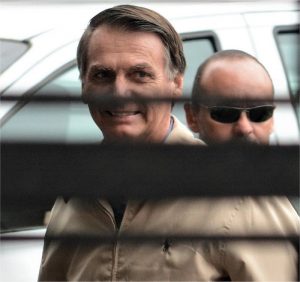Democracy in Brazil is not at a crossroads; It faces a firing squad.
Former army captain Jair Bolsonaro, who is expected to comfortably win the second-round presidential vote on October 28, has pledged to physically eliminate the opposition Workers Party. “These red outlaws will be banished from our homeland. It will be a cleanup the likes of which has never been seen in Brazilian history”, he told supporters in an October 21 video interview. “Either they go overseas, or they go to jail.”
Bolsonaro, who dedicated his 2016 vote to impeach President Dilma Roussef to the military officer responsible for her torture, cultivates nostalgia for the decades of military dictatorship and declares he will not accept the results of an election he loses. He promises to “put an end to all kinds of activism in Brazil” and calls for violence against trade unionists, landless peasants and indigenous peoples, social activists, women, the urban and rural poor, Afro-Brazilians and LGBTI people.
Is Bolsonaro a fascist? Or merely an ‘authoritarian’? Does it matter? Bolsanero retains the fascist inheritance of militarism and the cult of violence, misogyny, racism, contempt for democracy and hatred of the organized working class, but Bolsonarismo departs from the state-led corporatism which inspired European fascism’s Latin American offspring. His economic advisor, Paulo Guedes, has a simple program: “Privatize everything”. Backed by the powerful agrarian lobby, Bolsonaro would open up the Amazon basin to unrestricted foreign investment. The Temer government’s labour law ‘reforms’ which gutted collective bargaining and twenty-year cap on public spending will remain on the books. The end product is a toxic fusion of neo-liberalism with the violent class hatred and racism which have deep roots in Brazil’s history.
The formal mechanisms of Brazil’s historically weak democratic institutions were already hollowed out with the farcical destitution of President Rousseff and the jailing of Lula. The traditional ‘center’ parties have effectively vanished; Bolsanaro stepped into the void. The general political meltdown has given him a mass base. If he lacks a paramilitary organization prepared to storm parliament, there is always the army, which used Brazil’s 2006 intervention in Haiti for target practice in shooting urban slum dwellers. Private vigilantism, with the participation of the army and policy, has operated with impunity for years.
The survival of democracy now lies with Brazil’s trade unions and social movements, which Bolsonaro and his supporters have sworn to destroy.
The international labour movement must remain on high alert, permanently mobilized to defend democracy and the trade union movement in Brazil with all available means.

